
|   |

|   |
 e-mail: leelakaverivenkat@gmail.com The Sunil I knew and will miss Photos courtesy: Dr.Kothari's archives & Facebook January 9, 2021 (This is not a lament, but a recapture of events during the years I knew him, placing before you the man as he was.) 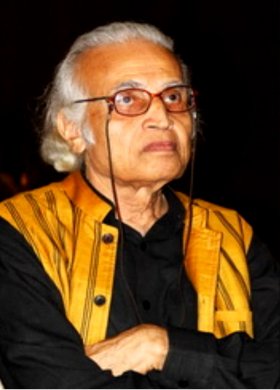 Photo: KK Gopalakrishnan With the passing away on the morning of December 27, 2020 of Dr. Sunil Kothari, World Dance lost one who was unarguably its most visible and passionately friendly supporter, who, over a long career spread over sixty years, seemed to overwhelm the dance scene like a 'sarva vyapi' registering his presence in every dance event in any part of the country and even abroad. 87 years old (December 1933-2020) when post Covid complications snatched him away, leaving many desolate, Sunil Kothari's hectic life comprised peripatetic travelling, jet setting across the world experiencing dance events - the unabated wanderlust even during his last few years, based in Delhi, seeing him travelling 27 to 28 days of every month - with the winter months, with advancing years, spent mostly in the south! "If I am in the same place for over a week, the soles of my feet start itching badly, with impatience," he always maintained. A bachelor whose place of stay never saw a permanently run kitchen ("footloose and fancy-free with no permanent ties to chain me to any place") he remained all his life eating out or the guest dropping in for a meal. As a world traveller, the laptop, perennial phone (an everlasting addiction, misplaced, lost and replaced countless times), a carry-on with some'jubbas' and his excellently tailored black achkan sported on all formal occasions, were the hallmark of Sunil - the ever ready, eternally roving critic. From Vadodra to Timbuktu, you would find the who's who of the world in his huge circle of friends, belonging to every field of activity. His 'hail fellow well met' exuberance along with the resourcefulness which located people to host him wherever he went, his photographic memory to reel off the names of people introduced to him days back, along with an uncanny ability for adjusting to any space without ever upsetting household routines along with a bonhomie and cheerful exuberance brightening up any atmosphere, earned him numerous well- wishers among acquaintances and friends. An unusually colourful character comprising a complex mix of qualities, Sunil could be a wonderful friend as also an awkward enemy. He never forgot a birthday, or a special day in your life and took the trouble of making it known that you were in his thoughts. My very early recollection, when I was just getting to know him, concerns an event in Nrityagram when Protima arranged a special abhinaya event in the forest area nearby. Trudging through thick growth of trees and uneven terrain, I stepped on a rock which suddenly rolled away from under my foot - my canvas shoe clad foot so badly twisted that I had to be practically carried back to the cottage. A few hours later, seeing the grossly swollen foot, now black with clotted blood, Sunil, without qualms, turning down all the well meant first-aid ministrations, ordered a taxi, taking me all the way to Bangalore city to consult a doctor. After confirmation of there being no fracture, he dropped me at an aunt's place, before droving off, making frequent enquiries and following up on the treatment. Who else but a Sunil Kothari (born in Kheda district of Gujarat) after graduating as a chartered accountant, secure with a promising teaching career in Sydenham College of Bombay, would one fine day jettison everything, getting so bitten by the dance bug, so as to embark on a brand new career to qualify as a dance scholar! Nothing was done in half measures. He secured a PHD on Dance from M.S. University of Vadodara, with research based on south Indian dance theatre traditions, the Kuravanji of Tamilnadu and Kuchipudi of Andhra Pradesh followed by special work on the Natya Sastra. To familiarise himself with the dancing body, he embarked on some training in Bharatanatyam under the Tanjavur tradition Guru Kuppiah Pillai who had settled down in Mumbai and later his son Kalyanasundaram Pillai. He also trained in some Kathak under H.Badri Prasad of the Jaipur gharana. With a D.Litt from Rabindra Bharati for his study on dance sculpture of medieval temples of North Gurjarat, Sunil Kothari became Professor in the Dance department in Rabindra Bharati University at Kolkata. He was 25 years old, when his interview of the world famous Ballet star Rudolf Nureyev, was published in India Today. 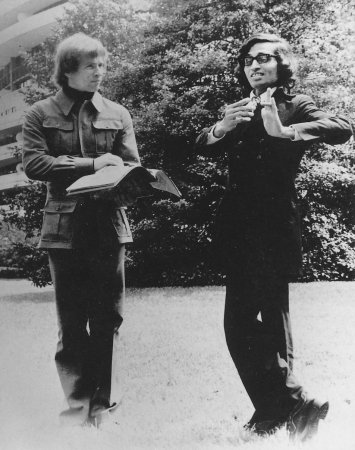 Sunil Kothari with Rudolph Nureyev His maiden journalistic appointment as dance critic was for Times of India. In a life marked by any number of achievements, as Fullbright scholar, Sunil taught in the Dance Department of New York. He later got recognition from the New York Critics' Association. He earned a Prof Emeritus recognition from the Department of Culture, Government of India, and became a Sangeet Natak Akademi awardee (1995) and much later also Fellow of SNA (2019). In 2001, he was awarded the Padma Shri. Not forgetting countless lifetime awards, he would seem to have done it all - though his hunger for titles never abated. Ever conscious of having to guard his turf carefully, he seemed to have an inner urge to constantly assert his topmost position - though with the numerous badges of recognition, one would have thought there was hardly any need to fear competition. In fact, so keen was he to be the first to cover any programme, that he would hurry his article with little or no editing and what with the constantly under staffed journals and poor subbing, the niceties of writing went overboard even in the printed edition. It is only lately that Sunil was made to realise the need for more careful penmanship. But his need to be the first never abated. While his relationship with me and writers closer to his age, despite some tricky situations in an era where space for dance writing is constantly shrinking, was cordial and warm, Sunil's relationship with a couple of promising upcoming writers (all PHDs) in their fifties was to an extent prickly. In this connection, I clearly recollect during a sightseeing trip about twenty years ago arranged for writers in Madhya Pradesh during a festival, Sunil's observation to me, "You know, what I really like about you is that you are not competitive." I am still trying to fathom whether the remark was flattering or otherwise! Very conscious of his titles, given his drive and ambition, Sunil unabashedly demanded privileged treatment, flaunting the 'Padma Shri' in particular - sometimes with amusing consequences. During a festival in the Punjab, where he and I were invited to the stage by the festival compere to light the inaugural lamp, Sunil, after the task finished, stayed back on stage to inform the announcer that she had failed to note in her introduction that he was a Padma Shri - upon which the flustered compere, immediately appearing before the audience tremulously blurted out, "Sorry for not mentioning that one of the Chief guests namely Shri Kothari is a Padma Shri awardee." Sunil appeared impervious to the sudden quiet followed by audience titter. The other incident which comes to mind is when, years ago, he entered the Madras Music Academy Hall before the dance festival was to start, promptly occupying a seat in the first row - announcing his Padma Shri while stoutly rejecting the polite usher's plea about the first row being strictly reserved for Season Ticket holders. The hapless usher when questioned by a person in charge as to how a non-ticket holder had been allowed to sit in the first row, mumbled his helplessness. Apparently some tactful Committee Member managed to convey to Sunil how much the Festival honoured and depended on the munificence of the VIP ticket holders, for enabling this incident, and without rancour Sunil was accommodated in the 2nd row. The phlegmatic acceptance of a 'Ya' or 'Na' after demanding special treatment citing titles, was so typically Sunil. Yet another incident, where the Padma Shri magic refused to work was during a trip to Chandigarh for an art event, when Sunil magnanimously set out to show me the delights of this city. In a city with 'No entry' signs before large monuments, government buildings and the Secretariat, Sunil's Padma Shri ploy having cut no ice, he pulled out a card with a print - "Sunil Kothari, Correspondent, Times of India", and this signalled "Open Sesame"! Jolted, I asked him what he was doing, citing a connection which belonged perhaps to a period when he started as a dance journalist in the paper. "You have nothing to do with them now." "So what?" he retorted with nonchalance. "I was very close to the Editor - late Duleep Padgaonkar - even stayed as a guest in his house in Paris - nobody will object." "But it is wrong, unethical," I argued. "Look! We are not stealing anything... Just gaining entrance into certain buildings in a city one wants to see. So what? Stop being squeamish!" As the day wore on, I had lost sight of the number of times 'Sunil Kothari - Correspondent TOI' was flaunted! This amoral attitude was typically Sunil. As a person set on goals, Sunil strongly believed that one had to create opportunities for attaining them. In my home during an informal lunch, in a spirited conversation with my late husband, I recollect his statement, "I see the goal and I go for it". When asked if he was concerned about the means too, Sunil's answer was, "Sir, I cannot be a Hamlet looking for the right moment - which will never come. One has to create it for oneself.' 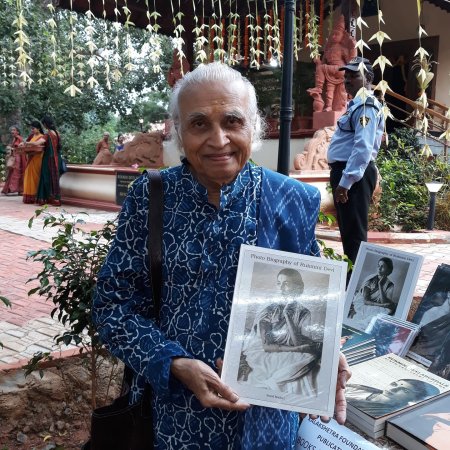 Sunil Kothari in Chennai Kalakshetra holding his photo biography of Rukmini Devi Sunil's singular contribution will remain the twenty odd books he authored. His career started at a time when India's traditional arts, particularly dance, were undergoing significant changes in context and performance space and his books on various dance traditions laying down the historical details of their evolution to the present position formed excellent foundational texts on how various forms came into being - and remain so to this day. As a historian of dance events, few could equal him. While his books on Kuchipudi, Kathak and Odissi were totally authored by him, the work on Bharatanatyam, Sattriya and Contemporary Dance were edited by him with chapters contributed by various experts. This apart, his thirst for knowing about dance was never ending - resulting in long sojourns in Kerala in Kerala Kalamandalam, trips to the important Sattras in Assam, frequent animated exchanges on Manipuri with late Guru Bipin Singh during his Rabindra Bharati stay with the Jhaveri Sisters at Kolkata, and contacts with scholars like T.K. Govind Vidyarthi and Mohan Khokar, whose writings Sunil read with avidity. That hunger to know was a part of him and Lynne Fernandez of Nrityagram in an animated exchange with me, a few days ago, gushed about how this dynamo of human energy functioned during frequent visits to the place. Up at 5am to watch the Yoga classes, he would stay on for the rigorous morning practices after which one would see him engaged in very personalised conversations with each student. He would take a walk round the farm engaging in animated exchanges with workers. During the evening there would be private get-togethers in a few cottages with sounds of much merriment and laughter floating in the air. Amazed by his unending passion for different types of contact she remarked, "Sunil was a peoples' man and at above 80, his unflagging energy in getting to know more people, was amazing! We loved having him here". Not endowed with a silver tongue for oratory, Sunil's talks, through their unpretentious first person approach, rang with an informal honest ring which communicated. Meticulous in preserving photographs and every shard of detail surrounding his innumerable contacts, his speeches were a who's who of personnel in the world of art - staggering in the kind of endless diarising, with minute details of exchanges .While concentrating on special artists, these personalised exchanges, substantiated by immaculate dates, supplemented by visuals ending with a film on the personality by somebody made up the presentation - rather than a critical interpretation of the person's approach to the dance, and its space/ time principles. The personal contact with artistes and places remained Sunil's greatest advantage. 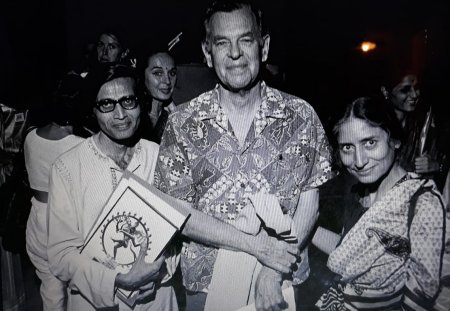 Sunil Kothari, Joseph Campbell, Kapila Vatsyayan As a critic, with all his foundational knowledge pertaining to the Sanskrit texts, and his strong feel for dance history, he specialised in a kind of anecdotal writing - blurring boundaries of critic and biographer. Never a specialist in music ragas and talas, he however had a deep fondness for poetry and this aspect, with some explanation when it came to non- Hindi poetry, made him a lover of interpretative dance. With his kind of closeness with dancers, some using him as the agony aunt listening to personal problems, for me, his critical perceptions got somewhat coloured by personal affiliations - and he for dancers was more the avuncular figure with always an encouraging word to say. Dancers welcomed him and found him very easy to talk to. He once insisted while talking to me, "I cannot write against a person who has taught me so much" or "He and I share a very close friendship and I cannot let him down" kind of remarks sometimes leading to some arguments between us. "Is this not an abdication of moral responsibility? You must then ask somebody else to write in your place," would be my approach. Sunil's knack for camaraderie with opposing groups known to hold aggressively unreconciled approaches to dance was unbelievable. After making the kind of remark in a review when Chandralekha burst on the dance scene, that one work of hers "had exposed three hundred years of hypocrisy in Bharatanatyam," the resourcefulness to assuage the burning anger and hurt among the Margam Bharatanatyam specialists and re-establishing his warm ties with them, or being so welcomed by the management in Kalakshetra that late Mr. Venkataraman, President of India and Chairman of Kalakshetra Board, highly impressed with Sunil's contacts abroad, sponsoring the large exhibition Sunil designed on Rukmini Devi, for me, was no mean feat in public relations. Till the end, while genuinely engrossed watching a Kalakshetra or Academy programme, Sunil also never stopped, on every possible occasion, to express a strong vote of confidence for what Chandralekha represented, and touchingly his Facebook posting even while he lay stricken in bed with Covid - days before he left this world, reminded people not to forget the Chandralekha Remembrance Day planned in Spaces. 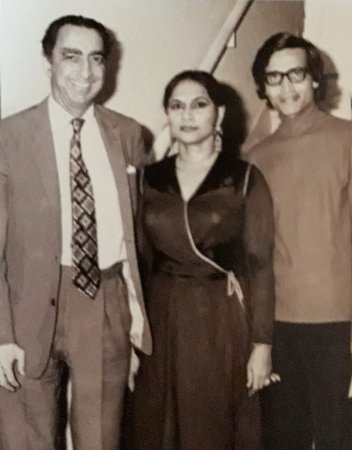 Jamshed Bhabha, Kumudini Lakhia, Sunil Kothari Sunil's passion for the performing arts scene included Film, Theatre, Dance, Poetry Sessions, Exhibitions of Painting, and even special lectures - the gamut of events. His loud laughter in the auditorium audible above all other voices, his passionate 'Hear Hear", his jack-in-the-box type figure ready to rise and applaud for encores, and the general bustle, energy and vitality he could inject into an event, will be sorely missed. What with Covid and Sunil's absence, the dance scene will be very quiet. 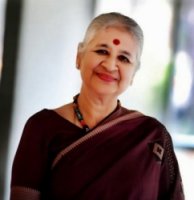 Writing on the dance scene for the last forty years, Leela Venkataraman's incisive comments on performances of all dance forms, participation in dance discussions both in India and abroad, and as a regular contributor to Hindu Friday Review, journals like Sruti and Nartanam, makes her voice respected for its balanced critiquing. She is the author of several books like Indian Classical dance: Tradition in Transition, Classical Dance in India and Indian Classical dance: The Renaissance and Beyond. Comments * What a perspicacious honest piece written without a hint of malice, but with a great deal of fond compassion. Kudos Leelaji. - Shailaja Khanna (Feb 5, 2021) * What a fitting tribute and recollection of Sunilji, written with humour, honesty and praise. - Sujatha Srinivasan (Feb 4, 2021) * What a tribute, Leela ji, Wow!! I am sure Sunil bhai never ever could imagine that he was so thoroughly understood by his colleague and friend. Compliments. - Prerana Shrimali (Jan 11, 2021) * A wonderful tribute to a dear friend. Compliments to Leelaji for this evocative piece. I am sure Sunilji would have loved it!!! - Satish Suri (Jan 9, 2021) Post your comments Pl provide your name and email id along with your comment. All appropriate comments posted with name and email id in the blog will also be featured in the site. |